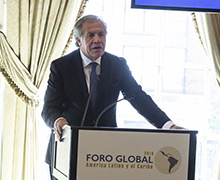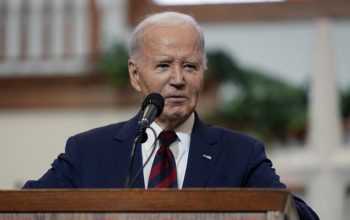news
OAS General Secretary Says Democracy is the Continent’s Most Important Political Principal
September 27, 2018
The Secretary General of the Organization of American States (OAS), Luis Almagro, stated that democracy is the continent’s fundamental political principal. In special remarks, he encouraged regional leaders to work with enthusiasm and determination to strengthen and broaden the conquests reached in this area.
Almagro presented his views during a special presentation delivered during the Sixth Panel of the Global
Forum on Latin America and the Caribbean that is being held in New York City with the support of the Global Foundation for Democracy and Development (GFDD), its sister institution in the Dominican Republic, the Fundación Global Democracia y Desarrollo (Funglode); IDEA Internacional; the Latin American Studies Institute/Columbia University,and the ECLAC. Various former presidents and experts from various countries and institutions are also participating in the
event.
During his keynote remarks, Almagro explained that democracy is the right path to follow on the road towards development and respect for the
fundamental prerogatives of citizens.
The OAS Secretary General also stated that the Latin American and Caribbean regions are experiencing a setback when it comes to the implementation of the democratic system, with the introduction of authoritarian governments that bring with it weak legal foundations.
In order to counterattack this situation, Almagro suggested the immediate launching of a fourth democratic wave that will facilitate
the expansion of democracy throughout the entire Western Hemisphere.
During his intervention, titled “Perspectives on Democracy in Latin America and the Caribbean,” the OAS Secretary General encouraged the peoples of Latin America and the Caribbean to work on a daily basis to build a solid and effective democratic system that will leave no space for the entry of authoritarian governments.
“We need less fear and more energy
to face the dictatorships in the region,” stated Almagro. “We have sent clear messages that we want a hemisphere free of crimes against humanity,” he added.
Almagro’s conference was commented by a panel of experts integrated by former Presidents Leonel Fernández, of the Dominican Republic; the President of the Central American Integration System (SICA), Vinicio Cerezo, from Guatemala; and Carlos
Mesa, from Bolivia. Also, Isabel de Saint Malo de Alvarado, Vice President of Panama andJorge Castañeda, former Mexican Foreign Minister. The panel was headed by Daniel Zovatto, Regional Director for Latin America and the Caribbean for IDEA Internacional.
Former Bolivian President Carlos Mesa said during his intervention that he agreed with Almagro in regards to the existence of
non-democratic governments in the region. He indicated that the most crucial issue is that certain strong regimes disguise themselves as democratic governments and manipulate a good portion of the population and generate confusion. “There is an intelligent but perverse manipulation of the democratic concepts,” he explained.
At the same time, Vinicio Cerezo, former President of Guatemala, reiterated that the democracy issue in
Latin America must be seen with an ample visionbecause the system grew due to the efforts carried out to prevent the return of the military dictatorships. This is why certain aspects were incorporated that contributed to the weakening certain rights of citizens.
Former President Cerezo also stated that politiciansand representatives from the private business sector are equally important in the strengthening of democracy and institutionality.
“To think differently, would be a grave mistake.”
At the same time, Panamanian Vice President Isabel de Saint Malo de Alvarado encouraged all to work to consolidate the democratic advances introduced by the region and highlighted that a major challenge is to work to make the local institutions more effective.
Former Mexican Foreign Minister, Jorge Castañeda, said that democracy in Latin America and the Caribbean
faces great challenges, specifically when it comes to the violation of human rights in certain countries. This situation has encouraged regional leaders to take the case to the International Court of Human Rights and Justice.
Former President Fernández also stated that the fundamental challenge faced by democracy in the region is to fully satisfy the expectations of the people.
He also indicated that the so-called “lost
decade” of the 20th century was provoked because the regional democracies were not prepared to satisfy the needs of their citizens.







